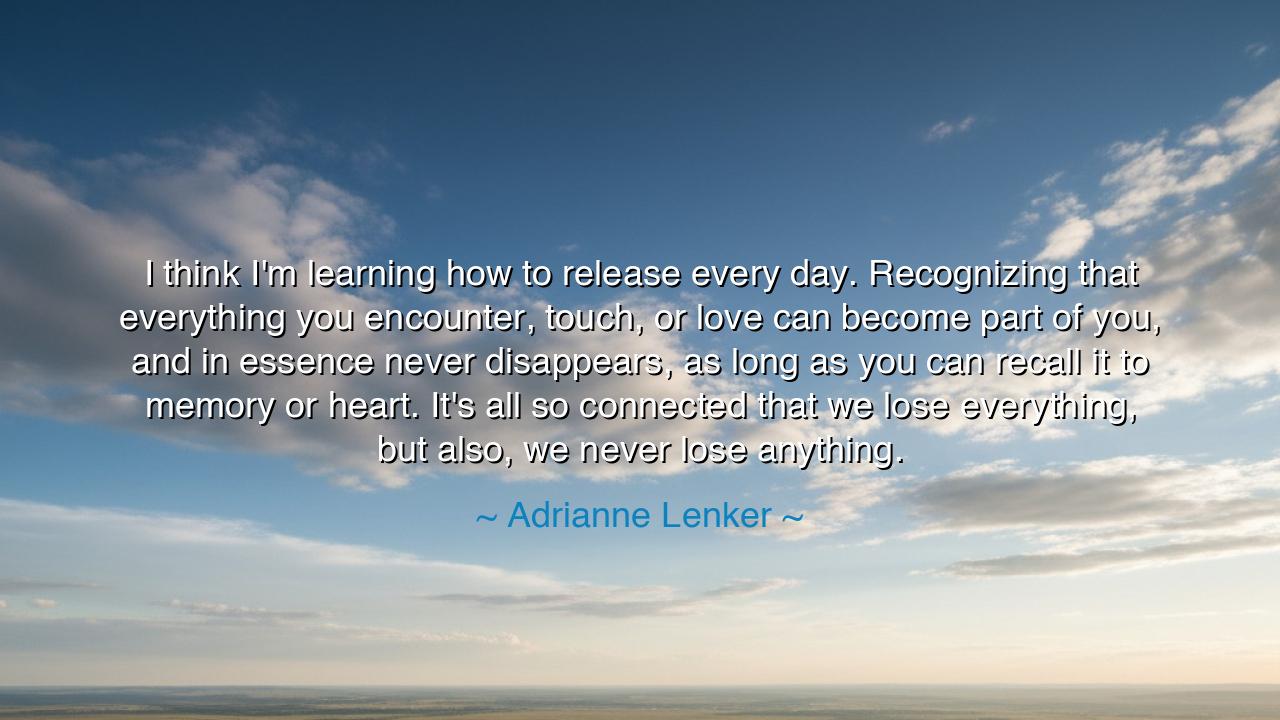
I think I'm learning how to release every day. Recognizing that
I think I'm learning how to release every day. Recognizing that everything you encounter, touch, or love can become part of you, and in essence never disappears, as long as you can recall it to memory or heart. It's all so connected that we lose everything, but also, we never lose anything.






“I think I’m learning how to release every day. Recognizing that everything you encounter, touch, or love can become part of you, and in essence never disappears, as long as you can recall it to memory or heart. It’s all so connected that we lose everything, but also, we never lose anything,” said Adrianne Lenker, a poet and musician whose words breathe like wind through the corridors of the soul. Her reflection is not merely about loss, but about the mysterious permanence that exists within impermanence — the way that every moment, every person, every sorrow and joy leaves its quiet imprint upon the eternal self. In these words lies the paradox of existence: that to truly live, one must release, and that through release, one does not lose, but becomes whole.
To learn how to release is one of life’s most sacred disciplines. It is not the cold detachment of one who no longer cares, but the gentle strength of one who trusts that love once known can never truly be taken away. Lenker’s wisdom speaks to the truth that everything we meet — each friendship, each heartbreak, each fleeting sunrise — becomes woven into the tapestry of who we are. When she says that what we touch or love becomes part of us, she recalls an ancient truth spoken by mystics and poets alike: that connection is eternal, even when form dissolves.
The ancients understood this mystery. Heraclitus, the philosopher of flux, once said that no man steps into the same river twice — for the river changes, and so does the man. Yet though the waters flow away, the essence of the river remains. So it is with the human heart. We are constantly letting go, yet each experience leaves behind a subtle mark, shaping the current of our being. When we mourn what is lost, we often fail to see that what we loved has already entered us, living on in thought, memory, and the invisible fabric of the soul. To release is not to cast away, but to recognize that nothing ever truly departs — it only changes form.
Consider the story of Helen Keller, who lost her sight and hearing as a child. To most, it would seem she lost the world itself. Yet through her teacher, Anne Sullivan, she discovered that connection does not depend on sight or sound, but on spirit. Every word she learned through touch became part of her inner universe. She could no longer see the light of day, yet she carried its warmth within her; she could not hear the music of the world, yet she felt its rhythm in her heart. Keller’s life shows the same truth that Lenker speaks: that though we lose everything in form, we never lose the essence of what has touched us deeply.
When Lenker says, “We lose everything, but also, we never lose anything,” she speaks to the eternal balance of holding and letting go. To live is to experience both the presence and absence of what we love. The seasons of life bring joy and loss, union and separation, birth and death — yet all these opposites are bound by the thread of connection. The people we love may fade from our days, but they remain within us as echoes, as lessons, as fragments of light that guide us forward. Even pain, when embraced and understood, becomes a form of wisdom that softens the heart and deepens compassion.
The act of recalling to memory or heart is a sacred art — it is how we commune with the past without being imprisoned by it. Through remembrance, we honor what has shaped us, but through release, we make room for what is to come. The wise soul holds memories as one holds a flame: not grasping too tightly, lest it burn, but not letting it die either. Each moment of release is a prayer, a quiet trust that what was beautiful will remain so within us, even as we continue on the journey.
Let this teaching, then, settle upon the heart like morning dew: to release is to live freely, and to remember is to live fully. Do not cling to what must pass, nor deny what once was. Instead, see how every encounter has left a trace of itself upon your soul — the laughter of a friend, the guidance of a teacher, the warmth of a fleeting love. Carry them gently, not as burdens, but as blessings. And when new seasons come, open your hands once more.
Thus, remember Adrianne Lenker’s truth: that we lose everything, yet nothing is lost. Each experience, once touched by awareness and love, becomes eternal within us. Live with open hands, open eyes, and an open heart. Let life flow through you like water through a riverbed — shaping, cleansing, renewing. For in learning to release, you will discover the deepest secret of all: that every loss, rightly seen, is not an ending, but a transformation — and through it, we are forever becoming whole.






AAdministratorAdministrator
Welcome, honored guests. Please leave a comment, we will respond soon